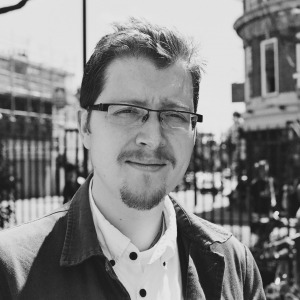Hi Tom – your new online course, Nightwriter, is a nocturnal writing course (our very first). What can we expect? And what happens to your poetry brain after dark?
Tom: Writing poetry is about making choices. Selecting what to say and what to leave unspoken. I am interested in erasure, the occult, in things unsaid, the shadow behind the text.
Through its occluding of those things we can normally see easily, night-time offers a powerful testing ground; a transformed – and potentially transformative – space for the poetic imagination.
Perhaps we will be writing by candlelight, or Kindle-light, or in the pitch black. Or training ourselves to think with a ‘night mind’, reversing usual behaviours and assumptions, exploring our dark side. Or perhaps we won’t even make it past midnight.
Many successful poets (and writers generally) are self-described insomniacs. Why do you think there is such a strong tradition between sleep and creativity?
Tom: On a practical level, many artists and writers have always struggled to find time for their creative practice, and it’s no different nowadays. I have a demanding full-time job, so the wee hours are my prime writing time. Once I go past midnight, everything somehow seems on hold, as if the clock has stopped and all the everyday worries of waking life have dissipated. It’s this relaxed state that gives me the will to do something as unprofitable as write a poem.
Have you heard about segmented sleep? Is this something you’ve ever tried?
Tom: Yes, this is the phenomenon of sleeping twice a day with a waking period in the middle. I believe it was common practice in medieval Europe. It’s not something I’ve tried, or would be able to easily. I do occasionally suffer from insomnia, but my problems is getting to sleep. Once I’m out, there’s no waking me.
I have always had very vivid dreams (and nightmares), and although they rarely end up in poems there is one particular, recurring dream that I have been trying to write towards for years. I can’t really explain it through visual images or sounds like in a normal dream. It’s sort of like being submerged underwater, but there is a strong sensation of a vast, complex structure, some geometric design through which I’m moving, or sinking.
Your new collection Dark Islands is published by Test Centre in May. What can we expect?
Tom: Dark Islands contains poems written over the past six years (since my debut collection How to Build a City came out). As such it’s not governed by any one defining theme; however I hope that readers will discern a network of interconnecting ideas and motifs: bank collapse, urban geology, magic, ritual, the island as a stand-in for the body. The book also tests out – in various askew ways – the idea of faith; or, rather, what I call a ‘dodgy faith in the truth’. Can we find a centre, a still point, in this whirlpool of voices?
My publisher, Test Centre, have produced Dark Islands beautifully. I can’t be more specific now, but let’s just say there’s a big surprise in the design.
Do you consider yourself a subversive person? Or even a romantic?
Tom: I am horribly conventional. I don’t like to stand out in a crowd, or break the law. The poems are a different thing. They are a space to be whatever you want, or not even to be, but to test, to take risks, probe and, yes, to subvert.
So I would say that I’m a conventional person who writes unconventional poems. Or aims to. Never mistake politics for aesthetics, or intention for result. I rarely intend to write what I do. That, for me, is the beauty of poetry.
I don’t know if I’m a romantic. You would have to ask my wife.
When did you first start writing poetry?
Tom: Mid-teens. I swung wildly between the gushing and the Gothic. I still do.
Do you have any unusual writing habits or superstitions?
Tom: Writing is the greatest superstition.
What do you like in a poem? What don’t you like?
Tom: Surprise. Ambition. Fun. Doubt. Taking language for a ride. I like a poem that takes itself very seriously, and then revels in pricking its own pomposity.
I don’t like poems about cats, but only because cats don’t trust me.
You’re also the publisher and editor of Penned in the Margins,. What are your top three editing tips when you’re whipping a poem into shape?
Tom: Three tips:
1. You know that word/phrase/line that doesn’t quite ring true? Yeh, that one. Cut it.
2. Relineate, relineate, relineate. You never know what will come out in the wash.
3. Make it right. And if you can’t, or won’t, make it right: make it very, very wrong.
What are you working on at the moment?
Tom: I’m writing a long sequence of short poems. The sequence is called Reliquary and each poem ‘Relic’. It’s about the holy and the unholy, the body, containment and cleanliness. I’m proud to say it features the first recorded reference to Chicken Shashlik in a poem.
What advice would you give to a young poet writing today?
Tom: Read widely. I mean widely. Don’t listen to your elders. Experiment. Make your own path. Listen to your elders.
Did Beyoncé ever get back to you?
Tom: I wish.
Put your insomnia to good use with ‘Nightwriter’, our new nocturnal poetry writing course with Tom Chivers. Book online or ring 0207 582 1679.

This insomniac has signed up. Looking forward to finding new ways to access ideas.